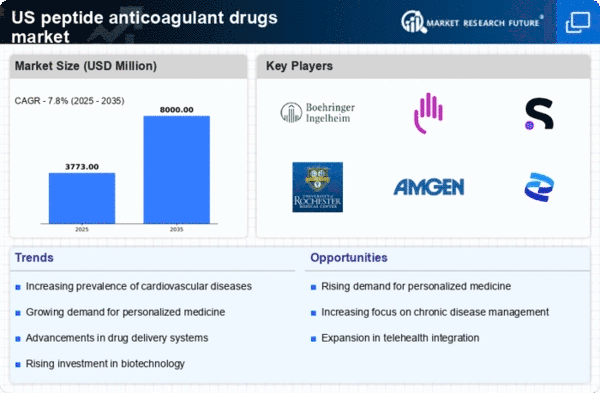Rising Geriatric Population
The aging population in the US is a significant factor driving the peptide anticoagulant-drugs market. As individuals age, the risk of developing thromboembolic disorders increases, necessitating effective anticoagulation therapies. The US Census Bureau projects that by 2030, approximately 20% of the population will be aged 65 and older. This demographic shift is likely to result in a higher demand for peptide anticoagulants, which are often preferred due to their targeted mechanisms and lower risk of bleeding complications. Consequently, the market is expected to grow as healthcare systems adapt to the needs of an aging population, with projections indicating a market value of around $3.5 billion by 2029.
Growing Awareness of Anticoagulant Therapy
There is a notable increase in awareness regarding the benefits of anticoagulant therapy among both healthcare professionals and patients. Educational initiatives and campaigns have been instrumental in highlighting the importance of managing thromboembolic disorders. This heightened awareness is likely to drive the peptide anticoagulant-drugs market as more patients seek treatment options. Furthermore, healthcare providers are increasingly recommending peptide anticoagulants due to their efficacy and safety profile. As a result, the market is expected to witness a compound annual growth rate (CAGR) of approximately 8% over the next five years, reflecting the growing acceptance and understanding of these therapies.
Advancements in Drug Formulation Technologies
Innovations in drug formulation technologies are significantly impacting the peptide anticoagulant-drugs market. Recent developments in delivery systems, such as nanoparticle-based formulations and sustained-release technologies, enhance the bioavailability and efficacy of peptide anticoagulants. These advancements not only improve patient compliance but also expand the therapeutic applications of these drugs. As pharmaceutical companies invest in research and development, the market is likely to see a surge in novel peptide formulations. This trend could lead to an increase in market size, potentially exceeding $4 billion by 2028, as new products enter the market and existing therapies are optimized.
Increasing Prevalence of Cardiovascular Diseases
The rising incidence of cardiovascular diseases in the US is a primary driver for the peptide anticoagulant-drugs market. According to the American Heart Association, nearly 48% of adults in the US have some form of cardiovascular disease. This alarming statistic underscores the urgent need for effective anticoagulant therapies. Peptide anticoagulants, known for their targeted action and reduced side effects, are becoming increasingly favored in clinical settings. As healthcare providers seek to manage these conditions more effectively, the demand for peptide-based therapies is expected to grow. The peptide anticoagulant-drugs market is projected to expand significantly, potentially reaching a valuation of $3 billion by 2027, driven by this increasing prevalence.
Increased Investment in Healthcare Infrastructure
The US government and private sector are significantly investing in healthcare infrastructure, which is likely to benefit the peptide anticoagulant-drugs market. Enhanced healthcare facilities and improved access to advanced medical treatments are facilitating the adoption of innovative therapies. This investment is particularly evident in the expansion of outpatient care centers and specialized clinics that focus on cardiovascular health. As these facilities become more prevalent, the availability of peptide anticoagulants is expected to increase, thereby driving market growth. The peptide anticoagulant-drugs market could see a valuation of approximately $3.8 billion by 2026, reflecting the positive impact of these infrastructural developments.
















